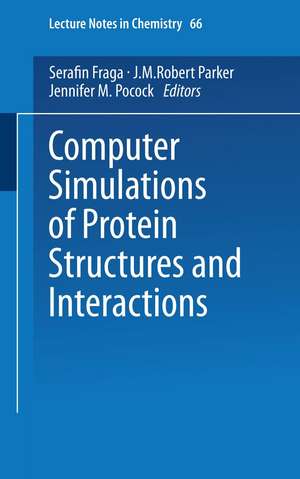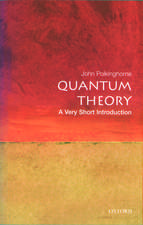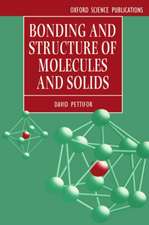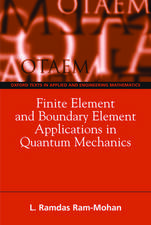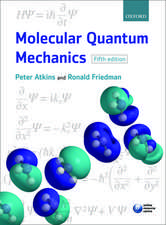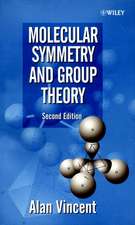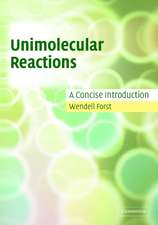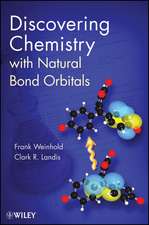Computer Simulations of Protein Structures and Interactions: Lecture Notes in Chemistry, cartea 66
Autor Serafin Fraga, J.M.Robert Parker, Jennifer M. Pococken Limba Engleză Paperback – 18 aug 1995
Din seria Lecture Notes in Chemistry
-
 Preț: 96.74 lei
Preț: 96.74 lei - 18%
 Preț: 1123.35 lei
Preț: 1123.35 lei - 18%
 Preț: 776.72 lei
Preț: 776.72 lei - 18%
 Preț: 779.57 lei
Preț: 779.57 lei - 18%
 Preț: 1005.74 lei
Preț: 1005.74 lei - 18%
 Preț: 997.88 lei
Preț: 997.88 lei - 18%
 Preț: 1004.00 lei
Preț: 1004.00 lei - 18%
 Preț: 1136.30 lei
Preț: 1136.30 lei - 18%
 Preț: 1117.03 lei
Preț: 1117.03 lei - 18%
 Preț: 1006.55 lei
Preț: 1006.55 lei - 18%
 Preț: 903.62 lei
Preț: 903.62 lei -
 Preț: 377.73 lei
Preț: 377.73 lei -
 Preț: 395.63 lei
Preț: 395.63 lei - 18%
 Preț: 728.43 lei
Preț: 728.43 lei - 18%
 Preț: 782.57 lei
Preț: 782.57 lei - 18%
 Preț: 1112.78 lei
Preț: 1112.78 lei - 15%
 Preț: 688.13 lei
Preț: 688.13 lei - 15%
 Preț: 646.62 lei
Preț: 646.62 lei -
 Preț: 393.35 lei
Preț: 393.35 lei - 18%
 Preț: 1124.30 lei
Preț: 1124.30 lei -
 Preț: 384.86 lei
Preț: 384.86 lei -
 Preț: 383.71 lei
Preț: 383.71 lei -
 Preț: 378.71 lei
Preț: 378.71 lei -
 Preț: 384.09 lei
Preț: 384.09 lei -
 Preț: 387.42 lei
Preț: 387.42 lei -
 Preț: 388.90 lei
Preț: 388.90 lei -
 Preț: 393.35 lei
Preț: 393.35 lei -
 Preț: 384.09 lei
Preț: 384.09 lei -
 Preț: 377.73 lei
Preț: 377.73 lei -
 Preț: 382.95 lei
Preț: 382.95 lei -
 Preț: 384.70 lei
Preț: 384.70 lei - 15%
 Preț: 644.63 lei
Preț: 644.63 lei -
 Preț: 386.00 lei
Preț: 386.00 lei -
 Preț: 389.70 lei
Preț: 389.70 lei -
 Preț: 384.09 lei
Preț: 384.09 lei -
 Preț: 385.25 lei
Preț: 385.25 lei -
 Preț: 392.21 lei
Preț: 392.21 lei -
 Preț: 386.00 lei
Preț: 386.00 lei -
 Preț: 403.37 lei
Preț: 403.37 lei -
 Preț: 378.71 lei
Preț: 378.71 lei -
 Preț: 383.50 lei
Preț: 383.50 lei -
 Preț: 390.63 lei
Preț: 390.63 lei -
 Preț: 389.31 lei
Preț: 389.31 lei
Preț: 383.12 lei
Nou
Puncte Express: 575
Preț estimativ în valută:
73.31€ • 76.75$ • 60.66£
73.31€ • 76.75$ • 60.66£
Carte tipărită la comandă
Livrare economică 07-21 aprilie
Preluare comenzi: 021 569.72.76
Specificații
ISBN-13: 9783540601333
ISBN-10: 3540601333
Pagini: 300
Ilustrații: XII, 284 p.
Dimensiuni: 127 x 203 x 16 mm
Greutate: 0.3 kg
Editura: Springer Berlin, Heidelberg
Colecția Springer
Seria Lecture Notes in Chemistry
Locul publicării:Berlin, Heidelberg, Germany
ISBN-10: 3540601333
Pagini: 300
Ilustrații: XII, 284 p.
Dimensiuni: 127 x 203 x 16 mm
Greutate: 0.3 kg
Editura: Springer Berlin, Heidelberg
Colecția Springer
Seria Lecture Notes in Chemistry
Locul publicării:Berlin, Heidelberg, Germany
Public țintă
ResearchCuprins
Protein Folding.- Amino Acids, Peptides, and Proteins.- Theoretical Formulation.- Quantum Mechanics.- Statistical Mechanics.- Molecular Mechanics: The Potential Energy Function.- Molecular Mechanics: Computer Simulations.- Practical Overview.- Experimental and Theoretical Data.- Databases.- Modeling of Isolated Systems and Associations.- Prediction of Secondary Structures.- Modeling of Tertiary Structures.- Molecular Associations.- Applications.- Structure-Aided Molecular Design.
Textul de pe ultima copertă
Lecture Notes in Chemistry Protein engineering endeavors to design new peptides and proteins or to change the structural and/or functional characteristics of existing ones for specific purposes, opening the way for the development of new drugs, vaccines, and industrial enzymes. Computer assisted simulations play an important role, as an auxiliary tool, in this task. This work develops in a comprehensive way the theoretical formulation for the methods used in computer-assisted modeling and predictions, starting from the basic concepts and proceeding to the more sophisticated methods, such as Monte Carlo and molecular dynamics. An evaluation of the approximations inherent to the simulations will allow the reader to obtain a perspective of the possible deficiencies and difficulties and approach the task with realistic expectations. Examples from the authors laboratories, as well as from the literature provide useful information.
